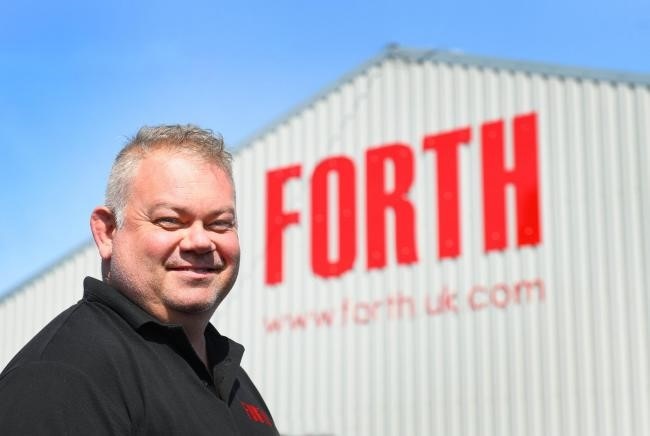WORLD-FIRST pipeline technology which will revolutionise performance and safety in industries around the world will be showcased for the first time later this month.
 Mark Telford, managing director of Forth Engineering
Mark Telford, managing director of Forth Engineering
The development of the first ever FSWBot, Friction Stir Welding Robotic Crawler for internal repair and refurbishment of pipelines, is designed to transform the way industries deal with pipeline issues.
Led by Forth Engineering in Cumbria, the FSWBot project will be presented at a British Manufacturing and Fabrication in the Offshore Energy Industry event in Aberdeen on November 27.
A presentation on the FSWBot has also been accepted at an Offshore Pipeline Technology Conference in Amsterdam in February.
And it will also be presented at a Friction Stir Welding International Symposium in Kyoto, Japan in May next year.
Peter Routledge, Forth Engineering Project Manager, said: “We are getting a lot of interest and inquiries about the FSWBot from across the globe. Interest is really building, including from America and Canada. ”
The project, sponsored by Innovate UK, seeks to integrate several state-of-the-art technologies including friction stir welding, milling, patch deployment and ultrasonic NDT, onto a robotic system which can be deployed to conduct repairs on pipelines without the need for the pipeline to be closed down for the duration of the repair.
If successful, it is envisaged that the system could be further developed to carry out a range of repair and fabrication tasks.
The FSWBot received funding from UK Innovate last year for a consortium led by Forth Engineering to develop a ‘proof of concept’ system.
Forth Engineering is working with consortium members TWI, J4IC, Innvotek and LSBU on the project which will have a major positive impact on safety within the industry.
Friction stir welding is a solid state welding process which generates enough frictional heat to soften or plasticise the metal without melting it, allowing metal components to be forged together at the joint line.
This system will demonstrate that a patch weld can be made in steel pipe under oil, and that a representative FSW system can be made small enough to operate in a 36-inch diameter export pipe.
The consortium wants to hear from companies which might have an interest in such a system, in order to consider their potential needs and applications, helping to ensure its benefits can be brought to as many industry sectors as possible while the technology is being developed.
Mark Telford, managing director of Forth, said: “As a company we have developed a worldwide reputation for developing a range of robotic solutions for use in harsh environments.
“The tools we have developed over the years have been for, and used by, Sellafield, to successfully solve challenges in the nuclear industry. So our technology is tried and tested in harsh environments.
“There’s a fantastic opportunity for other businesses and organisations in the UK and across the world, whether that’s other nuclear operations, or oil and gas, renewables, and perhaps areas we haven’t even thought of, to make use of that technology, and to share their challenges so we can develop the FSWBot in ways to help them.
“There are industries all over the world which face their own similar issues and by sharing knowledge and collaborating we can help each other overcome some of those challenges.
“At the moment, an industry, a company, or an organisation, may see their only solution as sending a person into that extremely hazardous area. But that costs a huge amount of money, takes a lot of time, and is, by the very nature of the situation, putting people’s lives at risk.
“We are very keen to talk to any businesses or organisations who are faced with that type of challenge and discuss with them alternative solutions to the problems they face.
“We would far rather those businesses talked to us and shared what their own particular issues are. That way we can see if we can help them. Because at the end of the day, that business, or organisation, might be able to save time, money and potentially save lives, just by talking to us and sharing with us the issue they face.”
The development of the FSWBot is ongoing with the project due to be completed by end of January, 2021.
How the FSWBot works:
The FSWBot is envisaged to be a five-segment or six-segment PIG type vehicle which will be inserted at the production end of the pipeline and will travel with the oil flow to a pre-designated spot to perform a repair.
One segment will carry the FSW machine and a steel patch dispenser, with the other segments carrying the navigation, control system, communications, NDT (non-destructive testing) and power storage/generation payloads.
On entering the pipe segment containing the pre-identified defects, the FSWBot will stop, then slowly advance until the FSW system is in place over the defect. It will then lock itself in place and confirm that it is correctly located to perform the repair.
An onboard turbine in a duct within the FSWBot will harvest energy from the oil flow within the pipe to augment any power cells carried on the system, with the duct providing through flow in the pipe.
Once energised, the FSW unit will deploy a milling tool to cut away the corroded area and prepare a pocket in the pipe wall into which a steel patch will be dispensed.
The FSW unit will then weld this patch in place and deploy the milling system again to ensure that the patch is flush with the pipe wall and will not initiate turbulent flow, nor impede the passage of subsequent cleaning or inspection PIGs.
FSWBot will then deploy NDT packages to inspect the weld for quality assurance before unclamping and moving downstream to repeat the process on any further defects.